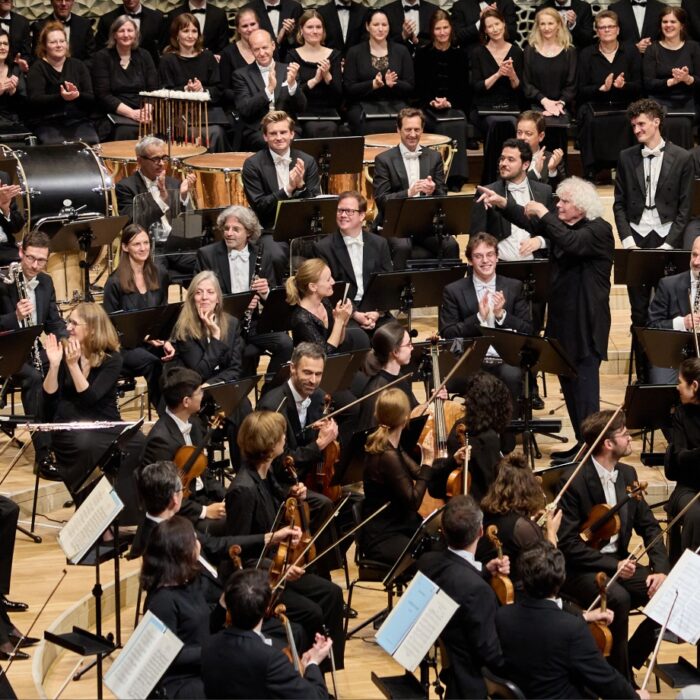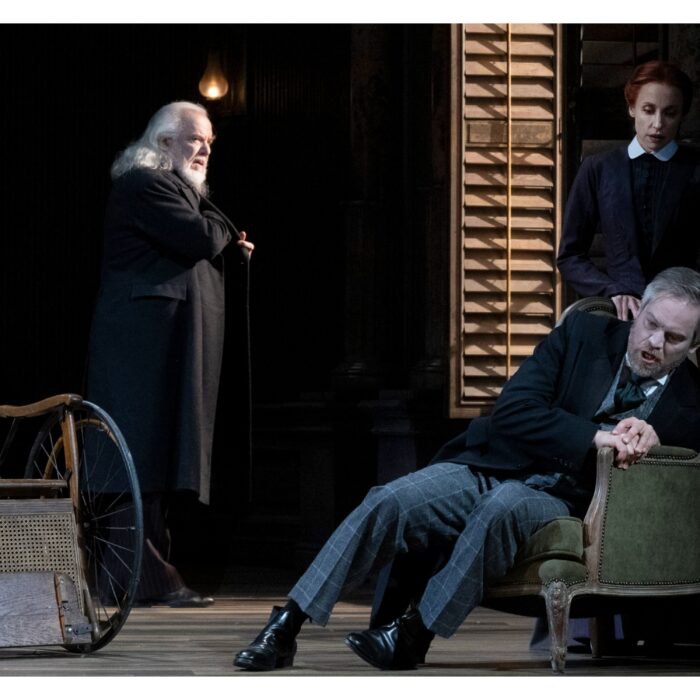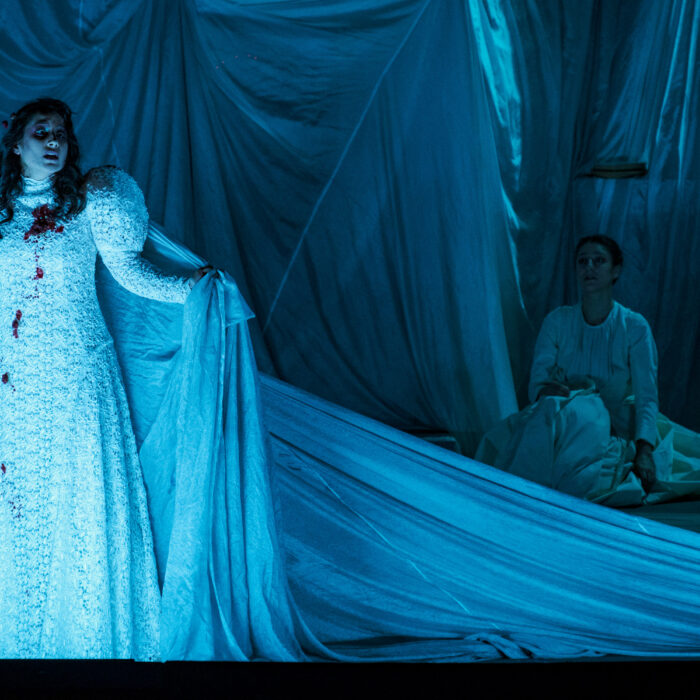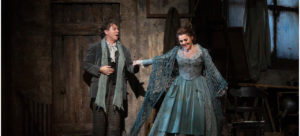
Metropolitan Opera 2019-20 Review: La Bohème
Roberto Alagna Returns To The Role Of His Met Debut
By Logan Martell(Photo Credit: Marty Sohl / Metropolitan Opera)
On Jan. 9, 2020, the Metropolitan Opera resumed this season’s run of Puccini’s “La Bohème.” Zeffirelli’s classically gorgeous production was enlivened by a solid cast of artists under the baton of conductor Marco Armiliato.
For this revival, Gregory Keller directed the production which saw it’s performers through a myriad of comedic, animated interactions without falling into slapstick humor. An early example of this came in Act one, as the bohemians’ dealt with Benoit. When let into the room, after a nicely-timed spit-take from Christian Van Horn’s Colline, Artur Ruciński’s Marcello readily lifted a chair he intended to beat the landlord with. Not long after, when inviting Rodolfo to Café Momus, the departing men did a quick rotation as they delivered a line from the doorway before being pulled back by another bohemian.
A Grand Return
In the role of Rodolfo, Roberto Alagna brought a wealth of dramatic understanding which supported his strong, yet poignant vocals. His Act one aria, “Che gelida manina,” was delivered with great warmth as his humble introduction melted away, building towards a powerful, spinto conclusion. This ardent quality returned in Act three for Rodolfo’s initial façade as he expressed his desire to break up with Mimì, before this was undone with a fearful diminish as he put his true feelings into words with touching phrasing. After Mimì emerged and the two softly resolve to break up, these feelings carried beautifully as Marcello and Musetta entered for their nuanced and well-executed quartet “Addio dolce svegliare alla mattina.” The differing sentiments between the pairs of lovers were clearly conveyed, and while Marcello and Musetta’s bickering raised a fair ruckus, Mimì and Rodolfo remained in a tender world of their own.
In Act four, Alagna’s emotions reached a tragic peak as Mimì laid dying. When reminiscing with her on their first meeting, his rueful chuckle fell to a crying quality that was deeply moving. When she finally passed, we heard Alagna ask “What does this mean… Why are you looking at me like this?” with his voice choked by abundant sorrow that tinged his final cries of “Mimì!”
A Delicate Lead
In the role of Mimì, Maria Agresta cut a remarkably delicate figure. When the door was opened for her entrance, we saw her with one hand resting against the frame to support herself moments before her first bout of illness. While this showed on her face, it was somewhat belied by the evenness of her held phrases before a controlled face-plant onto the table. Keller’s directions had Agresta and Alagna blow out their own candles, adding a sweeter, playful dynamic to their search for the key. Her Act one aria “Si, mi chiamano Mimì” carried with a soft, resonant quality; while this lent itself nicely to her rising phrase “ma quando vien lo sgelo…” it somewhat lessened the impact of the climax. Her sonorous, held phrase “cosi gentile il profumo d’un fiore,” finely conveyed Mimì’s love for flowers, as well as her modesty, as she gracefully demurred after catching herself being swept up by her passion.
Agresta’s appearances in Acts three and four were colored by the sense of Mimì’s beautiful frailty. This was first seen in little details such as when she sadly watched a couple passing by before she approached the cabin Marcello and Rodolfo were in, and built to her aria “Donde lieta usci.” Here Agresta employed soft, plaintive sustains as she outlined her phrases of faded love, reaching a finish that, while expressing the wish to remain friends, was still very hurt.
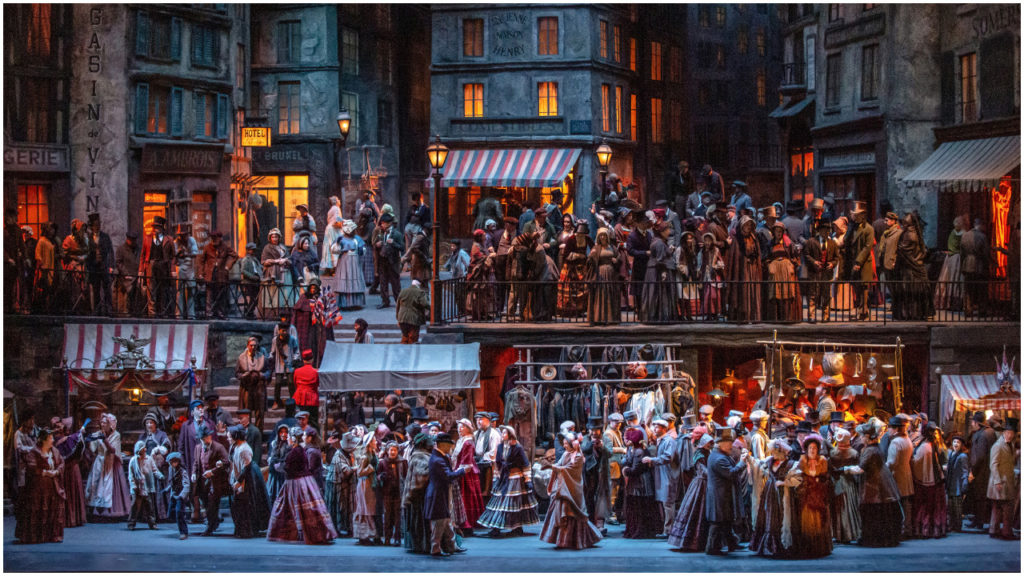
(Photo Credit: Evan Zimmerman / Metropolitan Opera)
A Strong Supporting Cast
As Musetta, Susanna Phillips returned to her signature role and delivered an exuberant and magnetic performance through her time onstage. Her flashy entrance was followed by constant examples of Musetta’s fussy, demanding nature, such as when she impatiently flapped her hands while waiting for someone to take her shawl. After constantly pushing Marcello’s buttons physically and emotionally, such as brushing him with her gloves and dress, or drawing all the men around her for her sultry rendition of “Quando m’en vo,” their reunion had them keep a few feet of distance as they erupted with vocal passion.
As Marcello, Artur Ruciński was consistently entertaining thanks to his comedic sensibility and compelling baritone. These qualities added much to the bohemians’ exchange with Benoit, and were put on full display for his emotional gauntlet in Act two. As Musetta pranced about the stage we see Marcello feigning indifference in different ways, such as ignoring her, badmouthing her, focusing on the drumstick he was eating during her aria, or even showing off two women he pulled from the bustling crowd of faces. All of this merely prolonged the inevitable as the two built towards their explosive reconciliation. Ruciński’s versatility came into play again in Act three as he goes from helping Mimì and Rodolfo to passionately fighting with Musetta. Despite these volatile emotions, we heard Ruciński and Alagna warmly reflect on their respective loves to open Act four.
Performing Schaunard and Colline were Elliot Madore and Christian Van Horn, respectively. After his casual Act one entrance, Van Horn easily integrated into the dynamic of the group as they enjoyed the last moments of warmth from the furnace, his phrase “It’s already dead” carrying with a grim, almost mournful tone. Madore’s entrance saw him joined by children to help deliver the food and wine before he scattered coins across the floor, clearly relishing in the brief bit of wealth. The two brought much to the group of friends as they joked, danced, and fought through their appearances. Van Horn’s Act four aria “Vecchia zimarra senti,” saw him deliver the firm, funerary lines from the relative privacy of the apartment’s balcony as they carried with a bittersweet resonance.
The evening’s performance had much to enjoy from the spirited cast of artists as their passion carried them through their numbers in ways that were often captivating to watch. Returning to the role in which made his Metropolitan Opera debut in 1996, Roberto Alagna powerfully showcased the fruits of his maturing since, making for an irresistible night of Puccini’s tragically-beautiful work.
Categories
Stage Reviews
